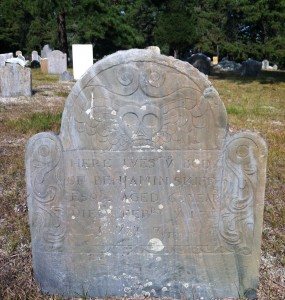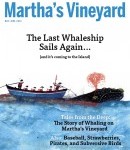 On the quiet Tuesday afternoon that follows Labor Day weekend, my son and I took a walk in the Chilmark Cemetery on Martha’s Vineyard in search of the headstone of Benjamin Skiffe, a prominent figure in early Tisbury and Chilmark before his death in 1717. The Skiffe family had settled near Mill Brook along what is today South Road in Chilmark and, during his lifetime, Benjamin Skiffe was owner of the fulling mill, captain of the local militia, and the island’s representative to the Massachusetts General Court for many years.
On the quiet Tuesday afternoon that follows Labor Day weekend, my son and I took a walk in the Chilmark Cemetery on Martha’s Vineyard in search of the headstone of Benjamin Skiffe, a prominent figure in early Tisbury and Chilmark before his death in 1717. The Skiffe family had settled near Mill Brook along what is today South Road in Chilmark and, during his lifetime, Benjamin Skiffe was owner of the fulling mill, captain of the local militia, and the island’s representative to the Massachusetts General Court for many years.
Benjamin Skiffe was also the uncle of a whaleship captain named Nathan Skiffe. I came to learn about Nathan Skiffe — and the tortuous final hours of his life — while writing my new book about New England pirate captives, At the Point of a Cutlass, published this summer. The younger Skiffe died at sea, the victim of one of the worst pirates to sail the Atlantic. But other members of the Skiffe family are buried in Chilmark, including Nathan’s uncle Benjamin. We found his worn headstone near the top of the gentle hill that sits at the back of the quiet cemetery.
It was a tragic twist of fate that placed Nathan Skiffe in the path of a pirate crew under the command of Edward Low on June 12, 1723. Low was racing out to sea, having barely survived a day-long battle with a British warship, HMS Greyhound, in which one of Low’s two sloops and about half of his men were captured. Low was in a rage when he spotted Skiffe’s whaling sloop about eighty miles offshore from Nantucket.
Boarding Skiffe’s sloop, Low’s pirates immediately singled out Skiffe as the captain of the whaling crew. Shouting and cursing, they “cruelly whipped him about the deck,” according to a report by one surviving member of Skiffe’s crew. Then Low raised his cutlass and hacked off both of Skiffe’s ears, one after the other. As Skiffe stood bleeding on the wooden deck of his sloop he may have begged for mercy, as many of Low’s captives did. Or other whalemen may have pleaded with the pirates saying that Skiffe was a fair and decent man, since pirates so often tortured captains that mistreated crews. But none of that mattered. “After they had wearied themselves of making a game and sport of the poor man,” a survivor recalled, “they told him that because he was a good master, he should have an easy death.”
That was little consolation for the Skiffe. Moments later, the pirates pointed a pistol squarely at Skiffe and shot him in the head.
At the Point of a Cutlass was released in June 2014 and is on sale now.
 Read more about the hazards of early New England whaling and encounters with pirates in my recent article in Martha’s Vineyard Magazine here.
Read more about the hazards of early New England whaling and encounters with pirates in my recent article in Martha’s Vineyard Magazine here.






